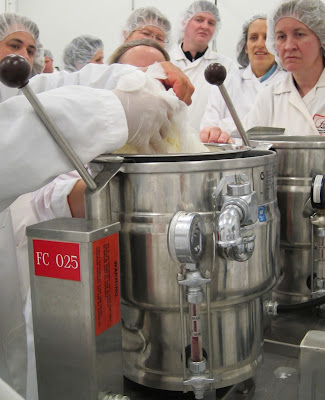Gail Hall, Edmonton - Part Two: Supporting the Local Food Culture
“It would be wonderful if everyone spent 10% of their food dollars locally”
Gail Hall, Seasoned Solutions, has been in the food business for 25 years (see Part One: Culinary Entrepreneur), and she is passionate about local food. She welcomes public speaking engagements in order to reach more people and to talk to them about the importance of eating local.
Gail wants to help people understand the connection between what they eat and how they feel. “What we put in our mouths is so important,” she says. “When food was pure, we didn’t have to think about it. But we can no longer trust the food industry.”
Supporting local food is not only a healthier personal choice – it’s also healthier for the local economy. “It would be wonderful if everyone spent 10% of their food dollars locally,” says Gail.
Culinary Tours: Combining Food and Culture
Gail’s appreciation for the relationship between food and culture has grown as she has travelled around the world.
Gail’s husband suggested that she start offering culinary tours because he recognized that, if Gail wanted to travel, she would have to build it into her business. Gail’s first tour was in 1995 when she took a group of 25 people to Santa Fe, New Mexico. Gail has since led tours to Louisiana, Seattle, New York, Italy and New Zealand and many other places. In March 2011 she will lead a food and wine tour through Chile and Argentina.
Gail’s tours explore local food from the ground up. The trip to South America will include an empanada cooking class, making wine in Colchagua Valley, a farmers’ market in Santiago and an Argentinean barbecue. The group will also soak up the atmosphere and culture with tango in Buenos Aires and visits to farms and ranches.
For Gail, the tours have been an eye opener to the close relationship between food, environment and culture. The unbelievable ice cream in New Zealand was thanks to the climate because cows could graze outdoors all year round. Observing parmesan cheese and prosciutto being aged naturally through salt and air was a reminder of the importance of slow food and respect for tradition. In New York, she recognized the value of retail to go, giving customers the option of buying gourmet food and reheating it at home.
“The tours make people think about their own food culture,” says Gail. “They have a better understanding of how hard producers work to get food to the table.”
Slow Food
As a result of her support for local food producers, Gail has become an active member of Slow Food Edmonton, the local chapter of an international movement that began in Italy in 1986. The international Slow Food website explains that,
Slow Food is good, clean and fair food. We believe that the food we eat should taste good; that it should be produced in a clean way that does not harm the environment, animal welfare or our health; and that food producers should receive fair compensation for their work.
We consider ourselves co-producers, not consumers, because by being informed about how our food is produced and actively supporting those who produce it, we become a part of and a partner in the production process.
The Slow Food Movement is now active in 132 countries and has a worldwide membership of over 100,000. The Edmonton convivium (chapter) has about 80 members. They hold a variety of events, including an upcoming dairy farm field trip, and their website provides a local good food guide. The group also hosts a book club with the option of reading either a book of fiction or non-fiction before each meeting.
More than 5,000 representatives of Slow Food will meet in Turin, Italy, in October for the international Terra Madre conference that is held biannually in conjunction with the Salone del Gusto food fair.
Gail will be attending Terra Madre, and I’m looking forward to talking with her when she returns home to find out more about the state of the slow food movement internationally.






Comments